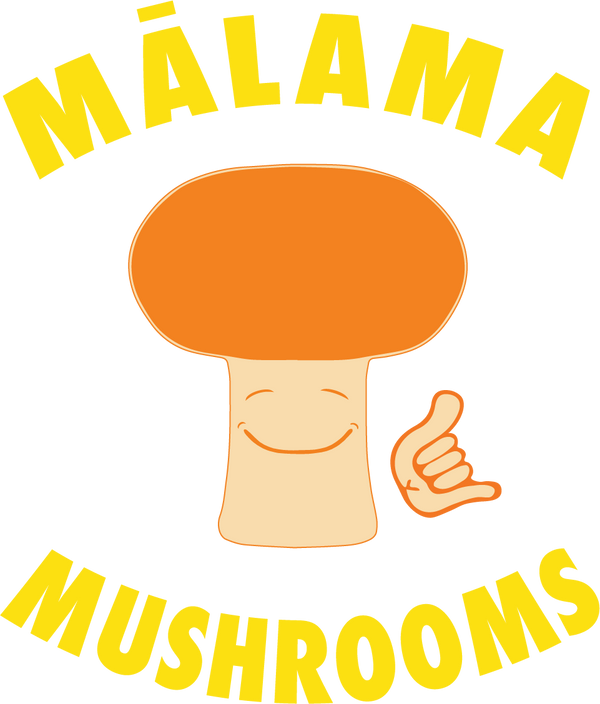
Six fungal friends + herbal allies to help seasonal blues 🌤
Share
As it gets colder for some of us and the days shorter, seasonal sadness can become a real threat to our mental wellness (we’ve already lost islanders... ‘what are seasons???’). Although there are plenty of things that should be prioritized in the stabilizing of your foundation before leaning on supplements, there are definitely mushrooms and herbs that can give you an instant mood lift!
*It is important to note that if you’re taking antidepressants some of the herbs mentioned below cannot be coupled with them. Please do research and consult your physician before self-diagnosing.

1. St. John's Wort – Miraculous Golden Flower
This ancient botanical has been proven to be as effective as antidepressants in treating mild to moderate depression with fewer side effects. It is a favorite of herbalists for treating nervous anxiety and sleep disorders.
St. Johns Wort has also been successfully researched in helping with wound healing, hormonal imbalances such as those with PMS and menopause, as well as helping with SAD (seasonal affective disorder) without decreasing sex drive like antidepressants can do.
*If you are already taking prescription antidepressants, do not alter your dosage or combine with St. John’s Wort without first consulting with your doctor. Nor should St. John’s Wort be concurrently used with MAO (mono amine oxidase) inhibitors such as Nardil or Parnate.

2. Lion's Mane - Hericium erinaceus
Most celebrated for its neuro-regenerative effects, Lion’s Mane mushroom has an impressive group of case studies dedicated to it for a diverse array of health attributes. A 2010 double-blind and placebo-controlled study set out to find lion’s mane’s effects on depression. The results showed the group ingesting the Lion’s Mane had significantly lower scores in the depression and indefinite complaints tests and that feelings of irritation and anxiety tended to be lower than the placebo group.
Study Link:
Reduction Of Depression And Anxiety By 4 Weeks Hericium Erinaceus Intake

3. Rhodiola – Golden Root
Rhodiola rosea is an adaptogen we love for many reasons. It helps to regulate our endocrine system (responsible for our stress response) as well as our limbic system (our emotional center).
The limbic system directly influences our consciousness through integral glands such as the hippocampus, amygdala, hypothalamus, and pituitary. It’s ability to enhance the actions of our neurotransmitters such as norepinephrine, dopamine, and serotonin (key players in experiencing happiness, clarity, joy, etc.) consequently contribute positive outcomes in emotion, memory, mood, pleasure, energy, and drive.

4. Cacao
Cacao is a great resource for alleviating symptoms of depression. It is rich in four scientifically proven bliss chemicals – serotonin, tryptophan, tyrosine and phenylethylamine. These neurotransmitters are known for eliciting feelings of wellbeing and happiness.

Anandamide, known as the ‘bliss chemical,’ is a neurotransmitter that has been isolated in Cacao, and is released naturally in the brain when we are feeling happy (Ananda means ‘bliss’ in Sanskrit). Additionally, Cacao contains enzyme inhibitors that inhibit the breakdown of anandamide in the body, thus increasing its uptake and contributing to sensations of ‘bliss’ associated with raw Cacao.


5. Mucuna Pruriens - Velvet Bean
Mucuna pruriens is abundant in L-Dopa, the amino acid found in our body known to be the precursor to dopamine, as well as a slew of other neurochemicals such as epinephrine, norepinephrine and serotonin. It is also rich in rare neurotransmitter production facilitating neurochemicals like 5-MeO-DMT and 5-HTP.
Mucuna is rich in a number of vitamins and minerals and has also been found to boost hormone production and libido, which can help to fight depression if imbalanced hormone levels are at fault.

6. Ashwaganda - Withania somnifera, Indian ginseng
Due to its calming effect on the endocrine and central nervous system, Ashwagandha is considered one of nature’s most powerful antidepressants. It has been shown to lower cortisol stress, and anxiety levels as well as stabilize mood better than standard antianxiety and antidepressant drugs with zero side effects or withdrawal symptoms.
It is powerful for treating various CNS (central nervous system) disorders, specifically epilepsy, stress, and neurodegenerative diseases. Ashwagandha has also been studied for its mood stabilizing effects, supporting hormone regulation, as well as preventing insomnia, and the seasonal blues.
So, there you have it! Six natural remedies to help combat symptom of seasonal sadness. Like we said, these should stay secondary to doing what we can to support our body naturally, such as maintain a nutrient-rich diet to combat inflammation and a stress-free lifestyle, complete with exercise and restful sleep regimen. But definitely don't overlook these functional herbs and fungi can make a huge impact on our body's functionality and mental wellness!

